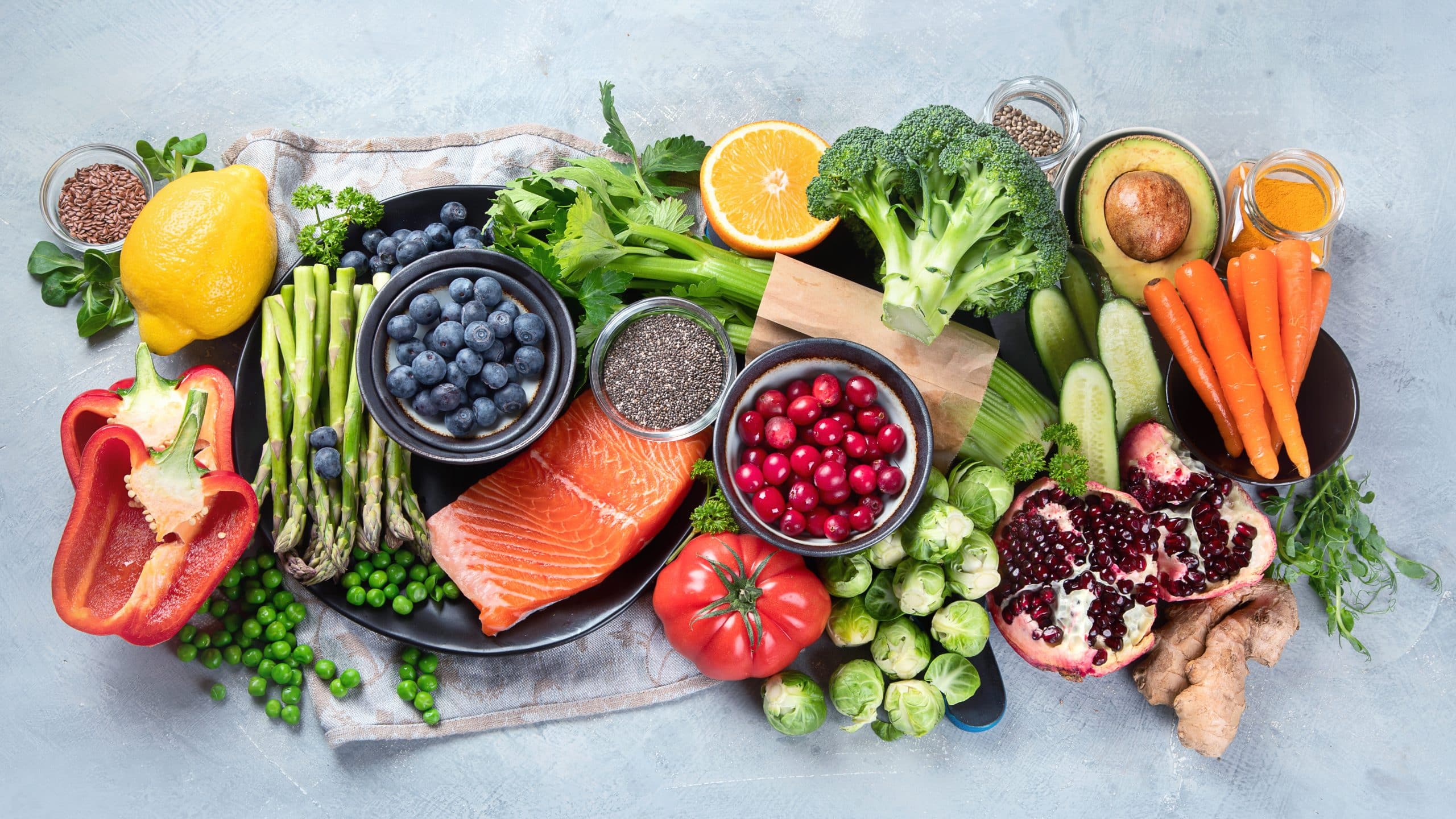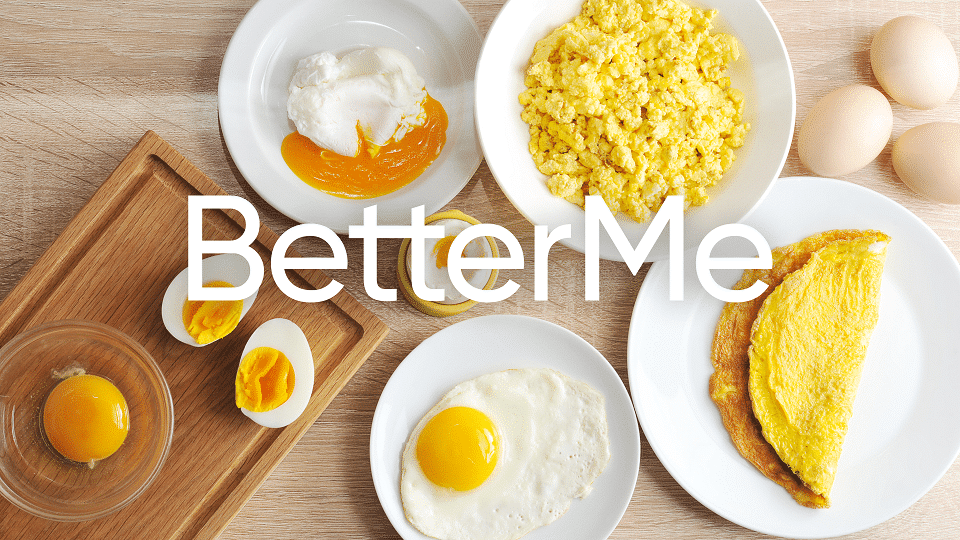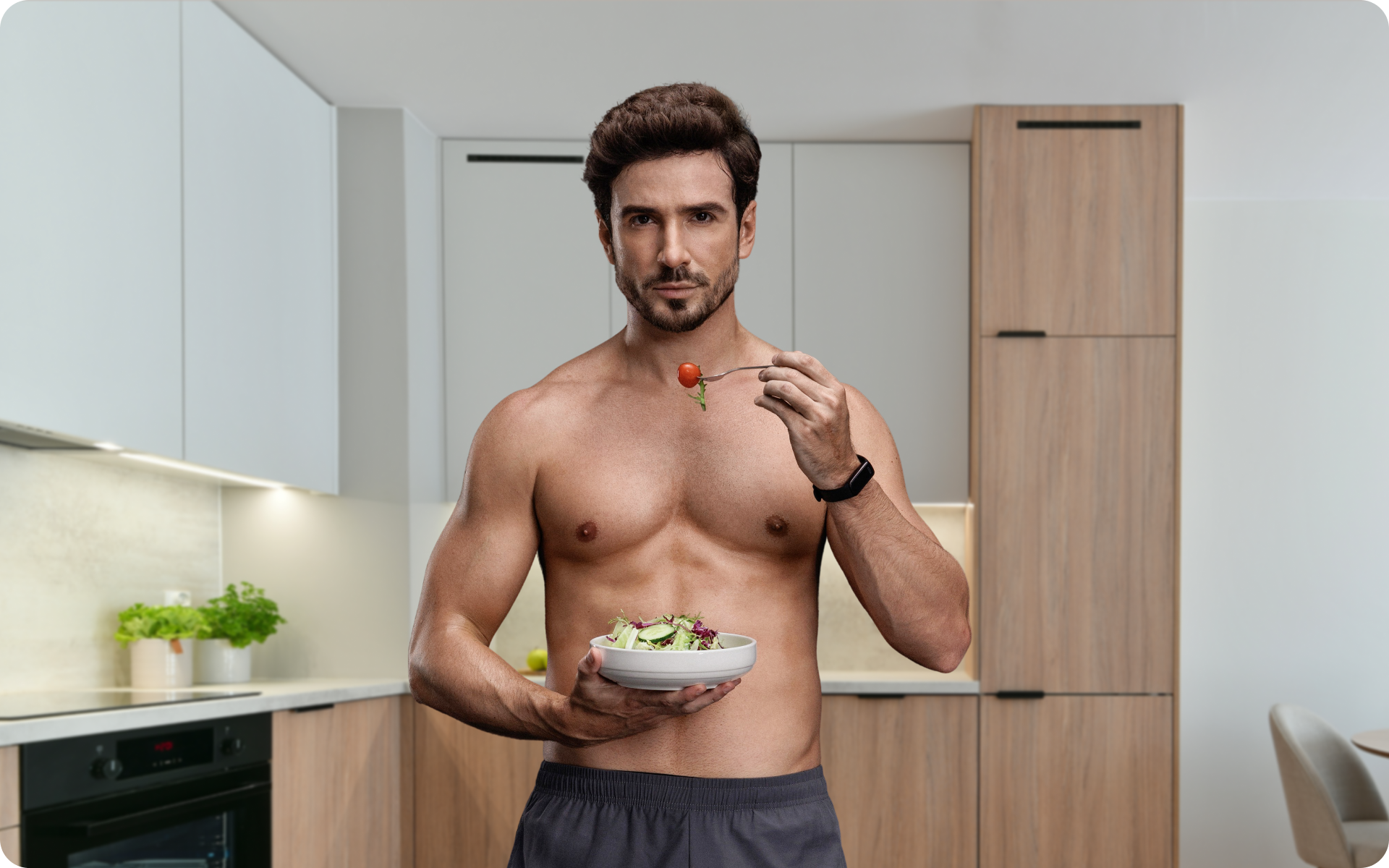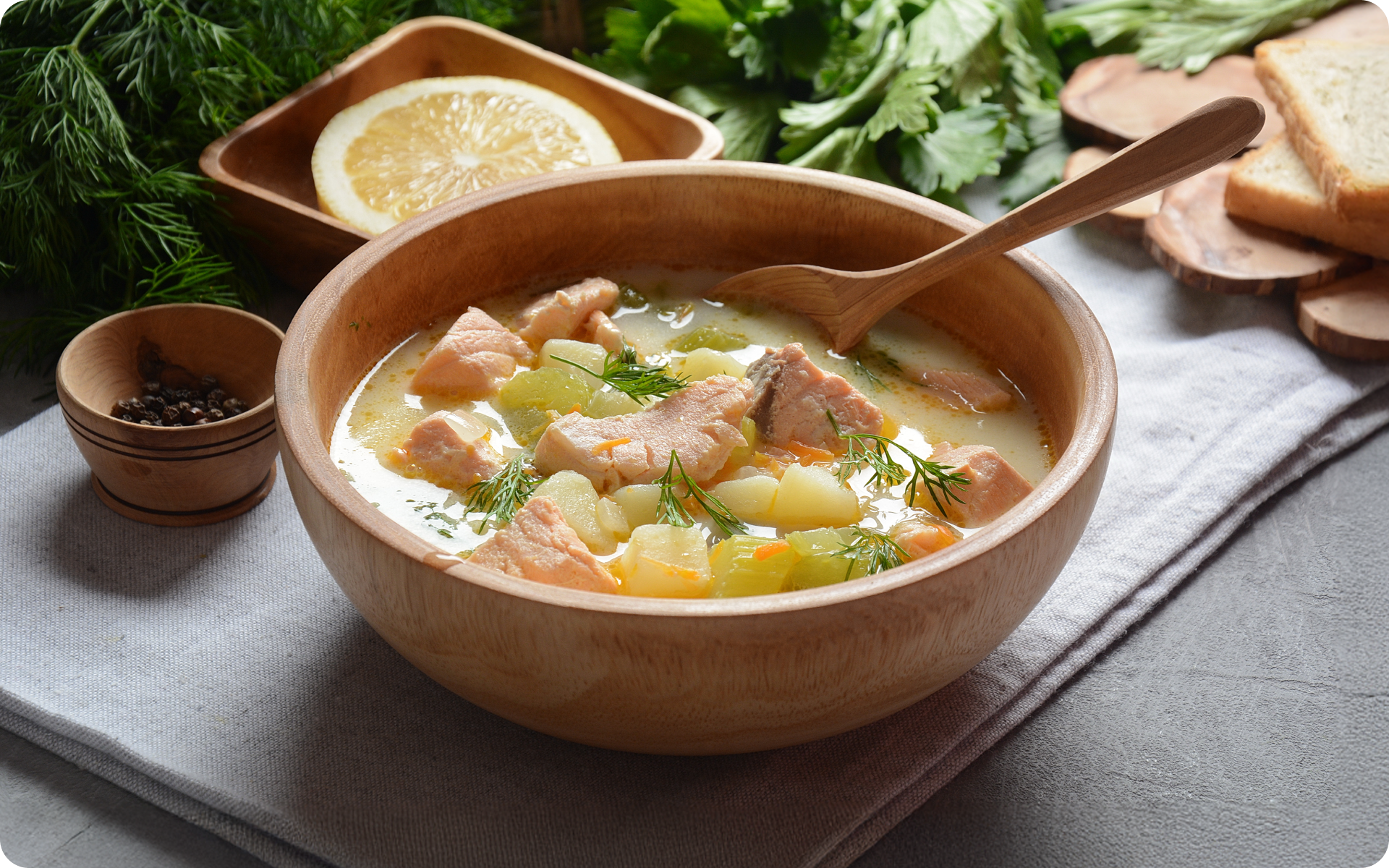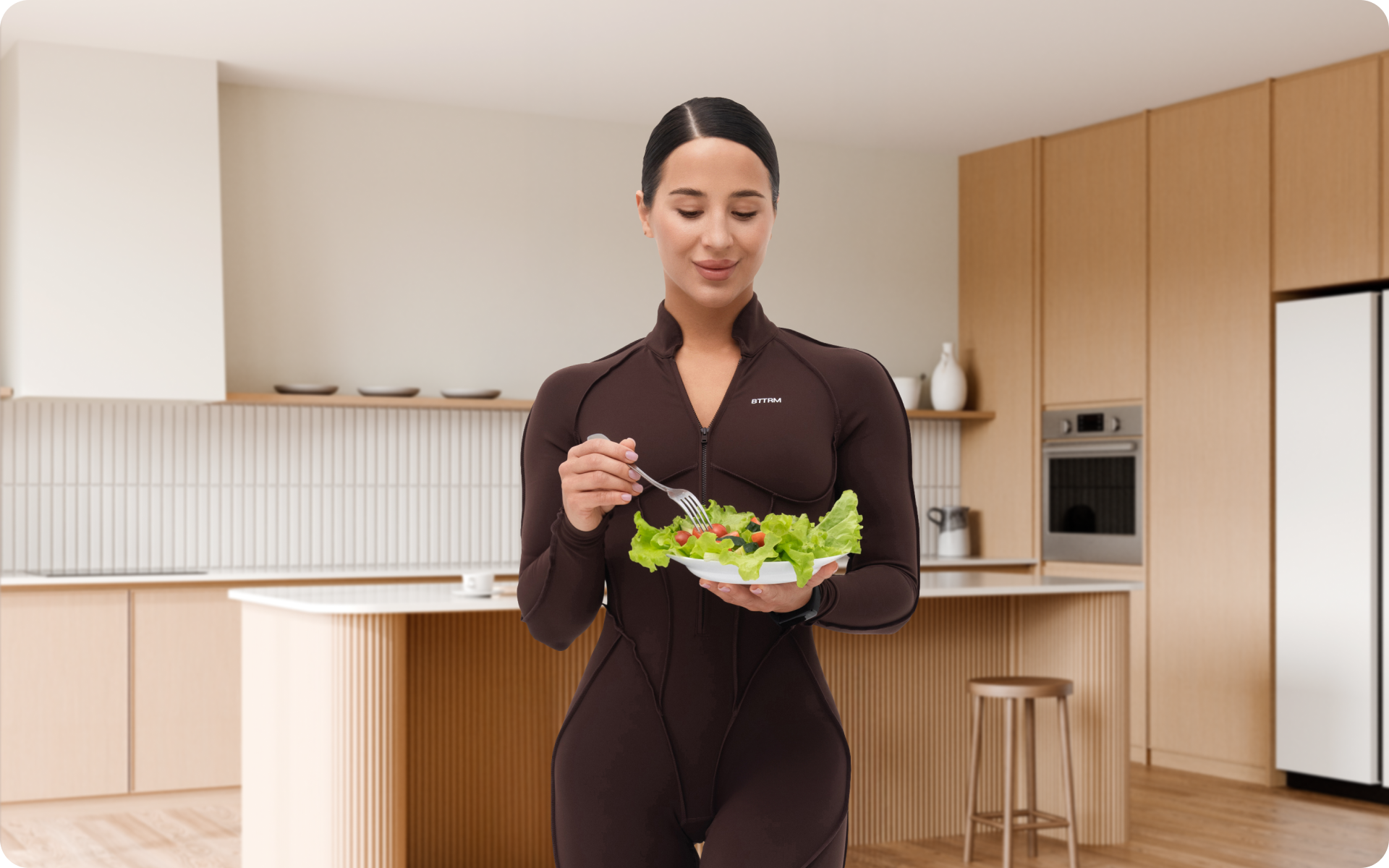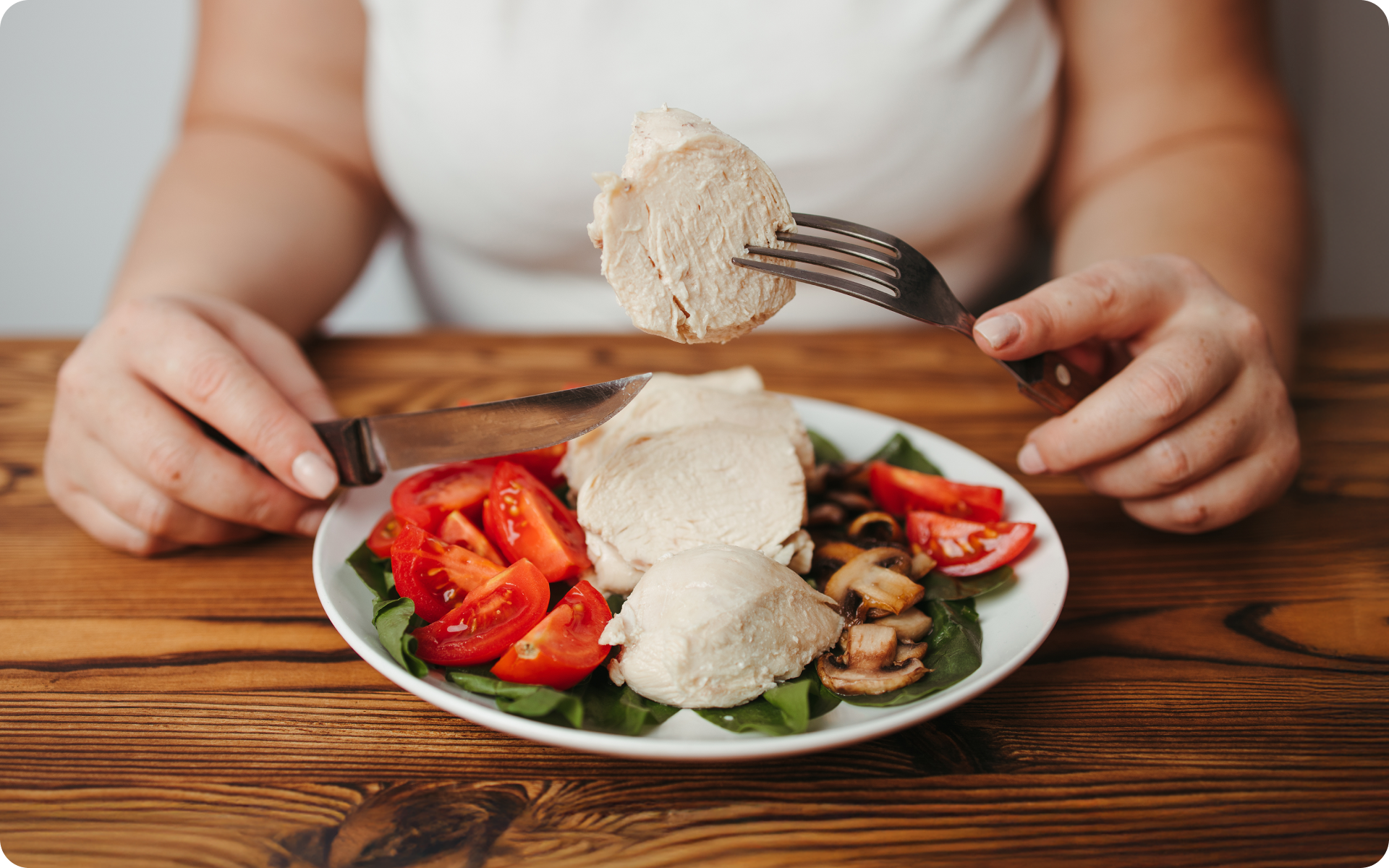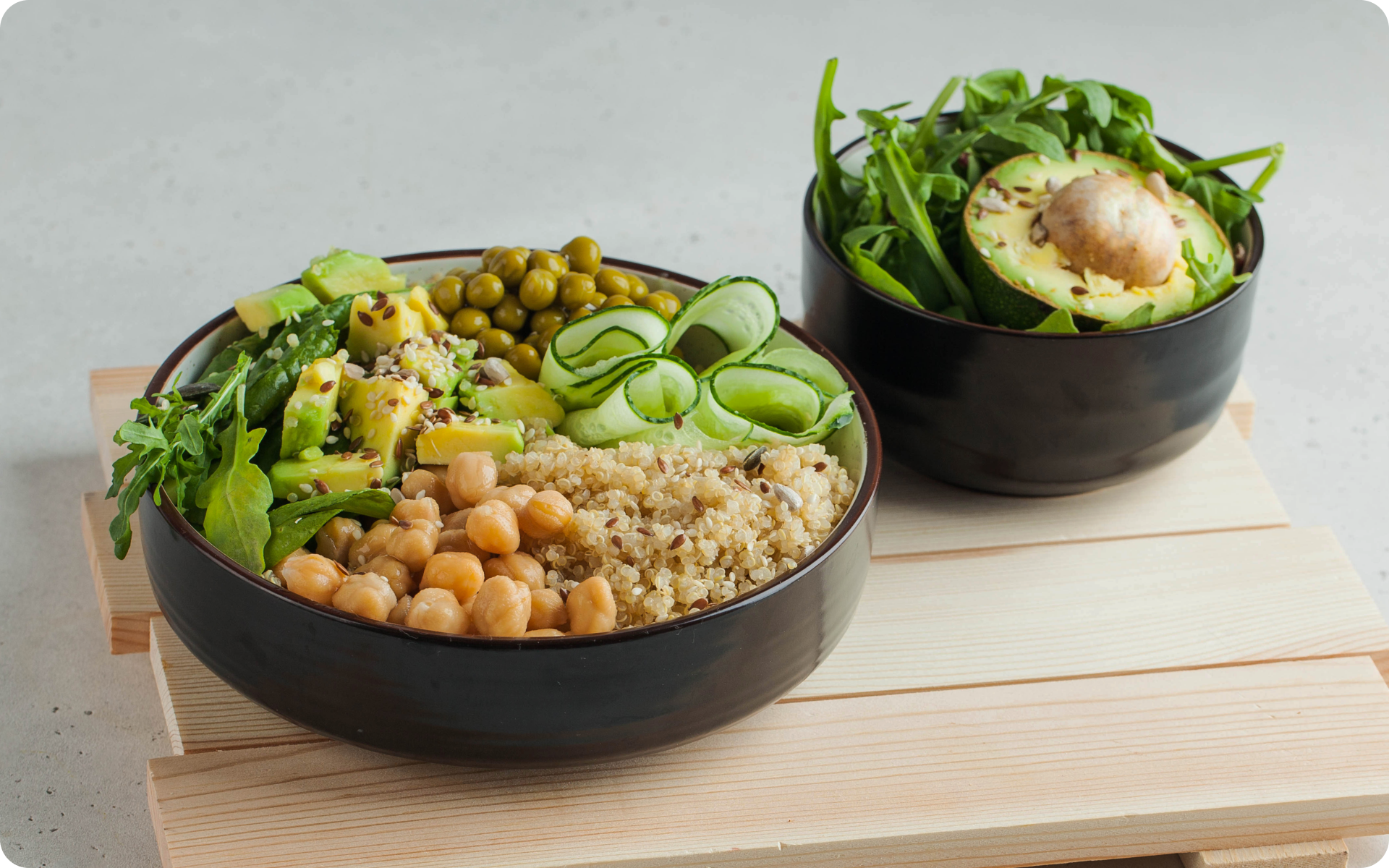Aging is inevitable, but it isn’t necessarily a bad thing. The truth is, our bodies go through natural changes as we grow older, and embracing this process with grace and self-care can bring about a sense of empowerment.
Even as we age it’s never too late to adopt healthy habits that can enhance our vitality and promote radiant skin. And if you haven’t guessed it by now, what you eat plays a crucial role in this journey.
In this comprehensive, science-backed guide, we will explore the power of nutrition in promoting youthful skin, boosting energy levels, and supporting overall wellness.
Can a Good Diet Make You Look Younger?
Numerous scientific studies support the idea that what we eat may significantly impact not only our health but also our physical appearance, including the aging process of our skin (11).
How? Well, there are three elements of aging that nutrition can positively influence: glycation (when sugar molecules attach to proteins and form cross-links that damage skin cells), oxidative stress (when free radicals cause skin cell damage), and inflammation (an immune response caused by various factors, to which a poor diet can contribute).
Yanking yourself back in shape has never been so easy with our game-changing fitness app! Start transforming your life with BetterMe!
The right diet can play an essential role in improving these factors, potentially helping to reduce the signs of aging.
Slowing Down Glycation
Glycation is a process in which excess sugar in our bloodstream binds to proteins, leading to the formation of harmful new molecules called advanced glycation end products (AGEs) (2).
Over time, AGEs can damage surrounding proteins like collagen and elastin that keep our skin firm and elastic. When these proteins get damaged, our skin becomes dry and wrinkled – the classic signs of aging (10).
Studies suggest that a diet low in added sugar and high in antioxidants can help slow down the glycation process, which may help keep your skin looking youthful and vibrant (23).
Fighting Oxidation
Oxidation is a process that occurs when our bodies break down the food we eat into energy. This process can often result in the production of harmful molecules called free radicals. These unstable molecules can damage cells, leading to signs of aging like wrinkles, dry skin, and even disease (20).
But here’s the good news: a diet rich in antioxidants, which are found abundantly in fruits and vegetables, can help combat the damaging effects of free radicals (15).
Preventing Chronic Inflammation
Inflammation is our body’s natural response to injury or infection. For example, when we sustain an injury there’s often swelling and redness, as our body sends white blood cells to the affected area.
In some cases inflammation can become chronic due to triggers such as a poor diet or environmental toxins. Chronic inflammation is behind many age-related diseases such as arthritis and cancer, and can also promote premature aging of the skin (7).
Studies suggest that a diet rich in anti-inflammatory ingredients like omega-3 fatty acids, vitamin E, and other vitamins and phytochemicals, may help reduce chronic inflammation associated with aging (25).
Promote Weight Management
Maintaining a healthy weight is another key aspect of an anti-aging diet plan. Excess weight, particularly when accumulated around the waistline, has been linked with numerous age-related diseases, including heart disease, diabetes, and certain types of cancer (27).
Additionally, rapid weight gain or weight loss can result in stretch marks and sagging skin, contributing to an aged appearance.
In our blog post on how to lose face fat, we suggested limiting added sugar, sodium, and saturated fat. The same theory applies here.
An anti-aging diet that includes a variety of fruits, vegetables, lean proteins, and whole grains can help you maintain a healthy weight. These nutrient-dense foods can promote satiety, helping you avoid overeating while delivering the nutrients your body needs for optimal function (17).
What Is The Best Diet for Anti-Aging?
The best diet for anti-aging is one that is rich in whole foods, low in ultra processed items, abundant in fruits, vegetables, lean proteins, and whole grains.
Research consistently shows that such a diet can help prevent some of the chronic diseases associated with aging (17).
Now let’s look at six diets that exemplify these principles, which are renowned for their anti-aging qualities.
1. Mediterranean Diet
The Mediterranean diet is a prime example of an anti-aging diet, as it’s high in fruits, vegetables, whole grains, and healthy fats, particularly olive oil. These foods are rich in the antioxidants and anti-inflammatory compounds that combat oxidative stress and inflammation—two key drivers of aging.
A large study published in Advances in Nutrition found that adherence to a Mediterranean diet is associated with longer telomeres, a marker of biological aging (18).
This diet is also low in red meat and high in fish and legumes, providing ample lean protein to support skin health and muscle maintenance.
The Mediterranean diet’s emphasis on olive oil, a source of monounsaturated fats and vitamin E, also promotes skin hydration and protection against UV damage (32).
2. Blue Zones Diet
The Blue Zones diet is based on the dietary habits of the longest-living populations worldwide, specifically in specific regions known as the Blue Zones.
This diet is rich in fruits, vegetables, whole grains, and legumes—all the foods that are loaded with antioxidants and fiber which support healthy aging and vitality.
The diet also promotes moderate consumption of lean meats like fish and poultry and emphasizes the intake of healthy fats from sources like nuts and olive oil.
The Blue Zones diet is low in processed foods and high in natural, whole foods, aligning with the key principles of a beneficial anti-aging diet.
3. DASH Diet
The DASH (Dietary Approaches to Stop Hypertension) diet focuses on reducing sodium intake and eating a variety of nutrient-rich foods that help lower blood pressure (26).
While its primary objective is to manage hypertension, its principles align beautifully with anti-aging nutrition. It is high in fruits, vegetables, whole grains, lean proteins, and low-fat dairy—all of which provide essential nutrients for skin health and overall vitality.
The DASH diet also emphasizes limiting the intake of sweets and red meats, which can contribute to inflammation and oxidative stress (26).
It’s worth noting that a systematic review, published in 2021, linked the DASH diet with reduced risk of heart disease, stroke, and diabetes—conditions often associated with aging (9).
5. Plant-Based Diet
A plant-based diet, which emphasizes fruits, vegetables, legumes, whole grains, nuts, and seeds, is also an excellent choice for anti-aging. These foods are rich in antioxidant vitamins like A, C, and E that protect against skin damage. They’re also abundant in fiber, promoting gut health and supporting cardiovascular wellness.
Plant-based diets are versatile, allowing for either strict vegetarianism or a more flexible approach incorporating small amounts of animal products (1). Either way, the central focus on plant-derived nutrients can support healthy aging.
A study in the Journal of the American Heart Association found that plant-based diets are associated with a lower risk of cardiovascular disease, an important aspect of healthy aging (22).
6. Japanese Diet
Finally, the traditional Japanese diet, known for its high proportions of fish, sea vegetables, rice, soy, and green tea, also holds potential for anti-aging. Fish provides essential omega-3 fatty acids, known for their anti-inflammatory properties and benefits for skin health (19).
Green tea, a staple in the Japanese diet, is loaded with antioxidants that fight against oxidative stress and aging (4).
A key point is that the Japanese diet is low in added sugars and unhealthy fats, further contributing to its anti-aging qualities. A large-scale study published in The BMJ found that adhering to the Japanese diet was associated with a lower risk of all causes of mortality (24).
Read more: Highest Protein Meat List: Here’s What Dieticians Recommend
What Foods and Drinks Make You Look Younger?
Looking younger starts from the inside out, and your diet can play a pivotal role in maintaining a youthful appearance. Consuming an array of nutrient-rich foods and drinks can help combat aging signs, offering radiant, younger-looking skin and vibrant energy.
Below are 10 anti-wrinkle foods to eat as part of your anti-aging diet plan.
Nuts
Top on our list of best anti-aging foods for younger looking skin is nuts, particularly almonds, which are rich in Vitamin E, an antioxidant that protects your skin from harmful UV damage. Almonds and other nuts also contain healthy fats that hydrate your skin, keeping it soft and supple (21).
Berries
Packed with antioxidants, berries such as blueberries and strawberries help combat oxidative stress, a key factor in aging. They also provide essential Vitamin C which aids in collagen production, keeping your skin firm and youthful (6).
Avocados
Avocados are a powerhouse of healthy fats, antioxidants and including folate. Eating avocados may help improve skin elasticity and reduce the appearance of wrinkles, making it a top pick in an anti-aging diet and lifestyle (5).
Sweet Potatoes
High in Beta Carotene, sweet potatoes provide nutrients which help protect your skin from sun damage and free radicals. Once consumed, our bodies convert Beta Carotene into Vitamin A, a vital nutrient for skin repair and maintenance (33).
Green Tea
Famed for its anti-inflammatory properties, green tea can delay skin aging and prevent wrinkles. It’s also filled with antioxidants known as catechins, which may help protect the skin (4).
Salmon
Rich in Omega-3 fatty acids, salmon is an anti-aging superstar. Omega-3s help keep your skin moisturized, reduce inflammation, and may even protect against skin cancer (s).
Mango
This tropical fruit is loaded with a variety of antioxidants, vitamins, and minerals that may improve skin elasticity and minimize the appearance of fine lines and wrinkles (21).
Dark Chocolate
Yes, you read that right! Dark chocolate is rich in flavanols that can help protect your skin from sun damage (12).
Bell Peppers
These colorful veggies are an excellent source of Vitamins A, C, and E, protecting your skin from aging and giving you a vibrant complexion.
Kale
High in Vitamin C and carotenoids, kale may help reduce inflammation and oxidative stress keeping your skin healthy (21).
While indulging in these anti-aging foods for women and men it’s equally vital to limit aging foods like sugary treats and processed meats, which can accelerate skin aging. For maximum benefits, incorporate these foods into your everyday meals, perhaps during a 21-Day Diet challenge or a longer anti-aging meal plan.
If you wish to cinch your waist, tone up your bat wings, blast away the muffin top – our fitness app was created to cater to all your needs! BetterMe won’t give excess weight a chance!
What Foods To Avoid To Look Younger?
Just as some foods can enhance your youthful vigor, others can accelerate the aging process. Here’s a closer look at some of the aging foods to limit :
Sugary Beverages
Drinks high in sugar, such as sodas or fruit juices, can contribute to inflammation and insulin resistance, which are associated with diseases like diabetes, and aging (29).
Processed Meats
Processed meats, like hot dogs and sausages, contain high levels of advanced glycation end products (AGEs). AGEs are formed when proteins or fats combine with sugar, and they can speed up the aging process (2). They are also associated with a higher risk of colorectal cancer.
White Bread and Pasta
These foods are high in refined carbohydrates, which can contribute to weight gain and associated health risks. Over time this could result in premature aging.
Trans Fats
Found in foods like margarine, baked goods, and fried foods, trans fats increase bad cholesterol, decrease good cholesterol, and promote inflammation and heart disease (30). These are banned in many countries, including the United States.
Alcohol
Excessive alcohol can cause dehydration, inflammation, and damage to your body’s cells, contributing to premature aging (3).
Can You Reverse Skin Aging With Diet Alone?
Diet is a powerful tool in mitigating the signs of skin aging, but it’s actually one part of a comprehensive anti-aging strategy.
Research suggests that while nutrient-dense, antioxidant-rich foods can significantly support skin health, they cannot wholly reverse skin aging on their own.
Factors such as genetics, environment, and lifestyle choices also significantly contribute to the aging process (13). To effectively combat aging, consider implementing the following strategies in conjunction with a healthy diet:
Sun Protection
Overexposure to the sun’s harmful UV rays can accelerate skin aging (31). Always wear a broad-spectrum sunscreen, even on cloudy days, and consider wearing protective clothing and sunglasses when outdoors.
Hydration
Drink plenty of water to keep your skin hydrated from the inside out, helping to maintain its elasticity and reduce the appearance of wrinkles.
Exercise
Regular physical activity boosts circulation and immune system functions, which are key in maintaining skin health and vitality.
Rest
Adequate sleep gives your body time to regenerate and repair skin cells, essential for a fresh, youthful appearance.
Skincare Routine
A consistent skincare routine, including regular gentle cleansing, exfoliation, and moisturizing, can help slow down aging signs and maintain a healthy, youthful complexion.
Quit Smoking and Limit Alcohol
Both activities can prematurely age your skin. Smoking narrows the blood vessels in your skin’s outer layers, leading to decreased blood flow and a pale and uneven skin tone (8). Alcohol, on the other hand, can dehydrate your skin, making it appear more wrinkled and aged (3).
Incorporating these strategies with a well-rounded diet can help combat skin aging more effectively than relying on dietary changes alone.
Read more: The Calisthenics Diet: Everything You Need to Know for Optimum Training
Frequently Asked Questions
What Foods Have the Most Collagen?
Foods rich in collagen include bone broth, chicken, fish, and egg whites. Additionally, certain foods provide nutrients that may promote collagen production, such as citrus fruits, berries, garlic, cashews, and tomatoes, thanks to their high vitamin C and sulfur content.
How Can I Look 10 Years Younger Naturally?
Looking younger naturally can be achieved through a combination of healthy lifestyle habits. This includes maintaining a balanced diet rich in antioxidants, staying hydrated, getting adequate sleep, exercising regularly, and protecting your skin from sun damage.
Implementing a regular skincare routine involving cleansing, exfoliation, and moisturization can also help maintain a youthful appearance.
Which Exercise Is Best for Anti-aging?
A combination of cardiovascular exercises, strength training, and flexibility exercises has proven beneficial for anti-aging (14).
Cardiovascular exercise like running or cycling improves heart health, strength training helps maintain muscle mass and bone density, and flexibility exercises like yoga or Pilates can improve balance and prevent injuries.
What Weight Makes You Look Younger?
Maintaining a healthy weight based on your body mass index (BMI) might contribute to a younger appearance. However, it’s essential to focus on overall health and wellness rather than specific weight goals. Extreme or rapid weight loss can lead to sagging skin and a more aged appearance.
The Bottom Line
No single diet holds the key to youth and vitality, but the diets we’ve discussed share common principles—that is, an emphasis on whole foods, plant-based ingredients, lean proteins, healthy fats, and limited ultra processed foods. Adopting these principles can contribute significantly to healthy aging and vitality.
Remember that diet alone cannot reverse aging signs. Other lifestyle habits and skincare routines that should be implemented for a comprehensive approach.
DISCLAIMER:
This article is intended for general informational purposes only and does not serve to address individual circumstances. It is not a substitute for professional advice or help and should not be relied on for making any kind of decision-making. Any action taken as a direct or indirect result of the information in this article is entirely at your own risk and is your sole responsibility.
BetterMe, its content staff, and its medical advisors accept no responsibility for inaccuracies, errors, misstatements, inconsistencies, or omissions and specifically disclaim any liability, loss or risk, personal, professional or otherwise, which may be incurred as a consequence, directly or indirectly, of the use and/or application of any content.
You should always seek the advice of your physician or other qualified health provider with any questions you may have regarding a medical condition or your specific situation. Never disregard professional medical advice or delay seeking it because of BetterMe content. If you suspect or think you may have a medical emergency, call your doctor.
SOURCES:
- A Look at Plant-Based Diets (2021, ncbi.nlm.nih.gov)
- Advanced Glycation End Products in Foods and a Practical Guide to Their Reduction in the Diet (2010, ncbi.nlm.nih.gov)
- Alcohol, Aging, and the Stress Response (1999, ncbi.nlm.nih.gov)
- Antioxidant effects of green tea (2011, ncbi.nlm.nih.gov)
- Avocado Consumption Increased Skin Elasticity and Firmness in Women ‐ A Pilot Study (2022, onlinelibrary.wiley.com)
- Blueberry Supplementation and Skin Health (2023, mdpi.com)
- Chronic Inflammation (2023, ncbi.nlm.nih.gov)
- Cigarettes Smoking and Skin: A Comparison Study of the Biophysical Properties of Skin in Smokers and Non-Smokers (2019, ncbi.nlm.nih.gov)
- DASH Dietary Pattern and Cardiometabolic Outcomes: An Umbrella Review of Systematic Reviews and Meta-Analyses (2019, mdpi.com)
- Defining skin aging and its risk factors: a systematic review and meta-analysis (2021, nature.com)
- Discovering the link between nutrition and skin aging (2012, ncbi.nlm.nih.gov)
- Eating chocolate can significantly protect the skin from UV light (2009, onlinelibrary.wiley.com)
- Environmental influences on skin aging and ethnic-specific manifestations (2012, ncbi.nlm.nih.gov)
- Exercise Attenuates the Major Hallmarks of Aging (2015, ncbi.nlm.nih.gov)
- Free radicals, antioxidants and functional foods: Impact on human health (2011, ncbi.nlm.nih.gov)
- Gut microbiome response to a modern Paleolithic diet in a Western lifestyle context (2019, journals.plos.org)
- Healthy Aging and Dietary Patterns (2022, mdpi.com)
- Mediterranean Diet and Telomere Length: A Systematic Review and Meta-Analysis (2020, sciencedirect.com)
- Omega 3 Fatty Acid and Skin Diseases (2021, frontiersin.org)
- Oxidative Stress in Aging Human Skin (2015,.mdpi.com)
- Plant-Based Foods for Skin Health: A Narrative Review (2022, sciencedirect.com)
- Plant‐Based Diets Are Associated With a Lower Risk of Incident Cardiovascular Disease, Cardiovascular Disease Mortality, and All‐Cause Mortality in a General Population of Middle‐Aged Adults (2019, ahajournals.org)
- Prevention of Protein Glycation by Natural Compounds (2015, mdpi.com)
- Quality of diet and mortality among Japanese men and women: Japan Public Health Center based prospective study (2011, bmj.com)
- The Association of Anti-Inflammatory Diet Ingredients and Lifestyle Exercise with Inflammaging (2021, mdpi.com)
- The Dietary Approaches to Stop Hypertension (DASH) Eating Pattern in Special Populations (2012, ncbi.nlm.nih.gov)
- The Epidemiology of Obesity: A Big Picture (2016, ncbi.nlm.nih.gov)
- The Paleolithic Diet (2023, ncbi.nlm.nih.gov)
- The role of sugar-sweetened beverages in the global epidemics of obesity and chronic diseases (2022, nature.com)
- Trans fats—sources, health risks and alternative approach – A review (2011, ncbi.nlm.nih.gov)
- Ultraviolet Radiation-Induced Skin Aging: The Role of DNA Damage and Oxidative Stress in Epidermal Stem Cell Damage Mediated Skin Aging (2016, hindawi.com)
- Virgin olive oil as a fundamental nutritional component and skin protector (2009, sciencedirect.com)
- β-Carotene Is an Important Vitamin A Source for Humans (2010, sciencedirect.com)

